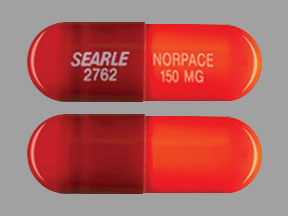
Norpace Coupons & Savings Card – Discount Prices from $166.91
Brand for: Disopyramide
My prescription
Edit
150MG, Disopyramide (180 Capsules)
Select pharmacy

CVS
$172.32
COUPON PRICE
Walgreens
$166.91
COUPON PRICE
Albertsons
$271.49
COUPON PRICE
Walmart
$301.82
COUPON PRICENorpace savings card
Show this card to your pharmacist
Walgreens
$166.91
BIN
ID
PCN
GRP
015995
LHKPX274791
GDC
DR33
Powered by
Related antiarrhythmics prescriptions
More prescriptions for ventricular arrhythmia
Related antiarrhythmics prescriptions
More prescriptions for ventricular arrhythmia
Norpace (Disopyramide) dosage forms
Dosage Quantity Price from Per unit 100MG 100 Capsules $79.46 $0.80 100MG 270 Capsules $191.43 $0.71 150MG 180 Capsules $172.32 $0.96 150MG 100 Capsules $99.42 $0.99
| Dosage | Quantity | Price from | Per unit |
|---|---|---|---|
| 100MG | 100 Capsules | $79.46 | $0.80 |
| 100MG | 270 Capsules | $191.43 | $0.71 |
| 150MG | 180 Capsules | $172.32 | $0.96 |
| 150MG | 100 Capsules | $99.42 | $0.99 |
What is Norpace used to treat?
Norpace is used to treat certain types of serious irregular heartbeats, such as ventricular tachycardia. It helps to restore normal heart rhythm and maintain a regular, steady heartbeat.
Is Norpace a beta blocker?
Norpace is not a beta blocker. It is an antiarrhythmic medication used to treat certain types of serious irregular heartbeats.
Does Norpace lower blood pressure?
Norpace (disopyramide) is primarily used to treat certain types of serious irregular heartbeats. While it is not specifically indicated for lowering blood pressure, it can have an effect on blood pressure as a side effect. It may cause a decrease in blood pressure in some individuals. It is important for patients to monitor their blood pressure regularly and consult their healthcare provider if they experience significant changes.
What are the side effects of Norpace 100mg?
Norpace (disopyramide) 100mg can cause several side effects. Common side effects include dry mouth, constipation, urinary retention, blurred vision, and dizziness. Some individuals may experience more serious side effects such as low blood pressure, heart failure, or an abnormal heart rhythm. It is important for patients to report any unusual symptoms to their healthcare provider promptly.
What class of drug is disopyramide?
Disopyramide is classified as a Class IA antiarrhythmic drug.
